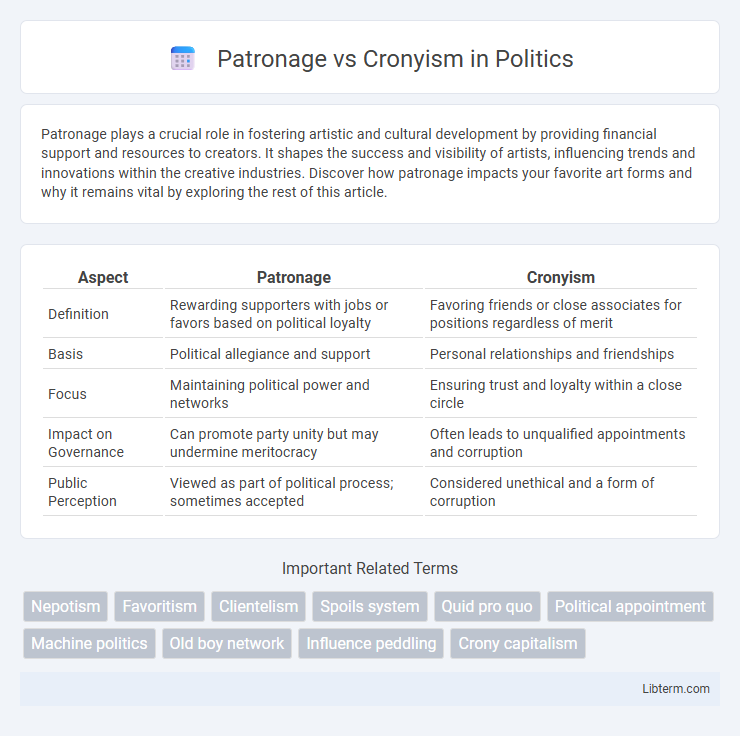Patronage plays a crucial role in fostering artistic and cultural development by providing financial support and resources to creators. It shapes the success and visibility of artists, influencing trends and innovations within the creative industries. Discover how patronage impacts your favorite art forms and why it remains vital by exploring the rest of this article.
Table of Comparison
| Aspect | Patronage | Cronyism |
|---|---|---|
| Definition | Rewarding supporters with jobs or favors based on political loyalty | Favoring friends or close associates for positions regardless of merit |
| Basis | Political allegiance and support | Personal relationships and friendships |
| Focus | Maintaining political power and networks | Ensuring trust and loyalty within a close circle |
| Impact on Governance | Can promote party unity but may undermine meritocracy | Often leads to unqualified appointments and corruption |
| Public Perception | Viewed as part of political process; sometimes accepted | Considered unethical and a form of corruption |
Understanding Patronage: Definition and Historical Context
Patronage refers to the support or sponsorship provided by influential figures, especially in political, social, or artistic contexts, to individuals or groups in exchange for loyalty or services, often shaping power dynamics throughout history. Historically, patronage systems were essential in forming political alliances, fostering artistic developments during the Renaissance, and maintaining control in feudal societies by awarding positions or favors. Understanding patronage highlights its role as a strategic tool for influence and network building, distinct from cronyism, which is based more narrowly on favoritism without meritocratic considerations.
What is Cronyism? Key Characteristics
Cronyism is the practice of favoring friends, associates, or close colleagues in political, business, or organizational appointments and contracts, regardless of their qualifications. Key characteristics include the allocation of resources, jobs, or privileges based on personal relationships rather than merit, often leading to inefficiency and corruption. This undermines fairness and transparency by prioritizing loyalty over competence and accountability.
Patronage vs Cronyism: Core Differences
Patronage involves appointing individuals to positions based on merit, loyalty, or performance, often enhancing organizational efficiency and trust. Cronyism prioritizes personal relationships and favoritism over qualifications, leading to biased decision-making and potential corruption. The core difference lies in patronage's alignment with competence and trust-building, whereas cronyism undermines fairness and accountability.
The Role of Patronage in Politics and Governance
Patronage in politics refers to the distribution of resources, jobs, or favors by political leaders to supporters, often to secure loyalty and strengthen political alliances. This practice can reinforce governance by fostering cohesive networks and facilitating policy implementation through trusted agents. However, patronage risks degenerating into cronyism when appointments prioritize personal relationships over merit, undermining institutional effectiveness and public trust.
Cronyism’s Impact on Institutions and Society
Cronyism undermines institutional integrity by promoting unqualified individuals based on personal relationships rather than merit, leading to inefficiency and corruption within organizations. This practice erodes public trust in governmental and corporate institutions, weakening governance and economic development. Societal consequences include increased inequality and reduced social mobility as favoritism outweighs fair competition and merit-based opportunities.
Advantages and Disadvantages of Patronage Systems
Patronage systems foster loyalty and political stability by rewarding supporters with government positions and resources, which can enhance governance efficiency when aligned with merit. However, they often undermine meritocracy, leading to inefficiency, corruption, and favoritism that harm public trust and institutional integrity. While patronage can mobilize political support, it risks perpetuating inequality and weakening democratic accountability.
How Cronyism Undermines Meritocracy
Cronyism undermines meritocracy by promoting individuals based on personal relationships rather than skills or qualifications, which erodes competence within organizations. This favoritism leads to inefficiency and demotivation among employees who are overlooked despite their capabilities. Over time, cronyism destabilizes institutions by prioritizing loyalty over performance, damaging overall organizational effectiveness.
Real-World Examples of Patronage and Cronyism
Patronage manifests in historical cases like Andrew Jackson's presidency, where political appointments rewarded loyal supporters, fostering party strength and governance. Cronyism appears in corporate scandals such as the Enron collapse, where executives appointed unqualified friends, leading to unethical decisions and financial ruin. Both practices undermine meritocracy, but patronage often seeks political loyalty, while cronyism prioritizes personal gain and friend-based privileges.
Strategies to Prevent Cronyism in Organizations
Implementing transparent hiring processes and merit-based promotions reduces the risk of cronyism by ensuring decisions rely on qualifications rather than personal relationships. Establishing clear policies and regular audits promotes accountability, discouraging favoritism and nepotism within organizational structures. Encouraging whistleblower protections and fostering an ethical culture empowers employees to report unethical behavior, further preventing cronyism.
The Future of Patronage and Cronyism in Modern Governance
The future of patronage and cronyism in modern governance faces increasing challenges from transparency initiatives and digital accountability tools that expose corrupt networks. Emerging technologies like blockchain and AI-driven oversight systems enable more effective tracking of resource allocation, reducing the opportunities for favoritism and nepotism. However, entrenched political cultures and weak institutional reforms may slow the decline of these practices, requiring continued international pressure and domestic advocacy for ethical governance.
Patronage Infographic

 libterm.com
libterm.com